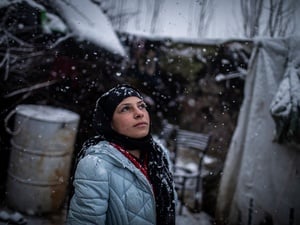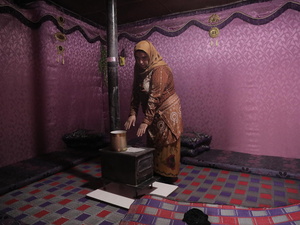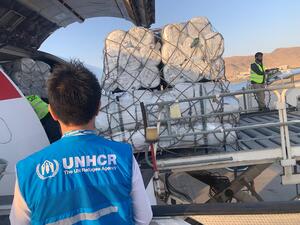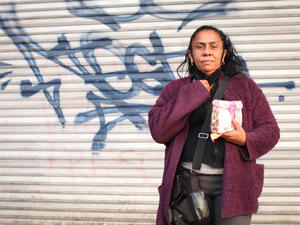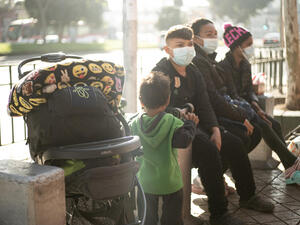Afghan refugees get extra help for Eid and winter
Afghan refugees get extra help for Eid and winter
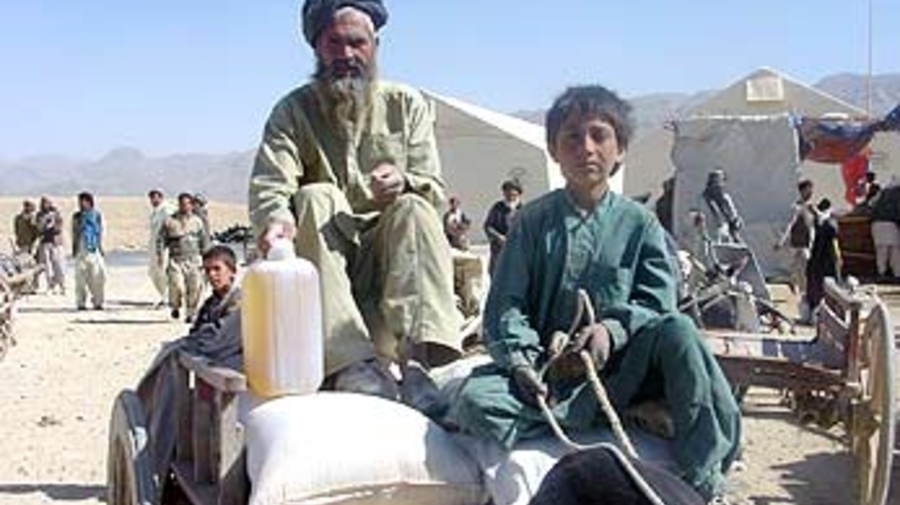
An Afghan family at Mohammad Kheil camp after receiving special food items like rice and tea.
DARA-2 REFUGEE CAMP, Pakistan, Nov 19 (UNHCR) - As Afghan refugees fast during the holy month of Ramadan and as winter temperatures set in, the UN refugee agency is rushing to provide extra assistance in the camps established two years ago in Pakistan.
Most of the assistance from UNHCR, such as blankets and heating fuel, is linked to the onset of harsh winter conditions, but the distribution of some additional food and other items is timed to coincide with Ramadan, which ends with days of traditional celebrations marking Eid.
Abdul Ali, an Afghan refugee from Faryab province who now lives with some 45,000 other refugees in Mohammad Kheil camp in Pakistan's Balochistan province, was among the refugees assembled to receive items like tea and rice that are not in food distributions in normal months.
"Ramadan is a very special time for all Muslims," he said. "We fast all day and at the end look forward to having a good meal.... The people who have cared for us will surely be blessed by Allah."
There are still more than 200,000 refugees in the "new" camps that were established after the September 11, 2001 attacks on the United States and the subsequent war against the Taliban in Afghanistan triggered a fresh wave of Afghan refugees seeking shelter in Pakistan.
These refugees, unlike the nearly one million other refugees in Pakistan's camps who fled earlier fighting in Afghanistan, receive a routine monthly food distribution through the UN World Food Programme (WFP) that includes wheat flour, pulses, cooking oil and salt.
But in North-West Frontier Province (NWFP), where about 80,000 of the refugees live, dates, green tea and sugar cane candy donated by Rotary International have been distributed in advance of Eid, which is determined by the sighting of the moon but is expected to begin for Afghans on November 25.
In NWFP and Balochistan, where the remainder of the refugees are sheltered, there have also been distributions this month of essential household items such as floor mats, plastic jerry cans and sets of kitchen pots and pans.
"These new sets of kitchen utensils are going to be a big help for my wife, who was fed up cooking with the old ones," said Mir Mohammad, originally from the northern Afghan city of Mazar-i-Sharif. The refugee, who is now in Dara-2, one of the camps established outside Chaman on the border between Afghanistan and Pakistan's Balochistan province, was also carrying plastic jerry cans that are intended for storing water and cooking oil.
The distributions are made possible by occasional donations by various organisations to UNHCR. Refugee heads of family, after showing their registration papers to prove they are residents, go one by one into the large tents where supplies are stored and receive an allotment determined by their family size.
"We are involved in distributing the monthly WFP ration to the Afghan refugees. The items other than the regular food are most welcomed by the refugees," said Sami Ullah Khan of Global Movement for Women and Children, a UNHCR implementing partner in the Balochistan refugee camps, as refugees filed out of the storage tent.
While the extra items make an appreciated bonus in advance of Eid, it is the preparation for winter that is most urgent. Cold weather may be biting early this year. Temperatures, which soar above 40° Celsius in the summer, have already plunged well below freezing at night in Balochistan.
"The winters in this area are very cold," said Hukum Khan, who fled with his family from the neighbouring Afghan province of Kandahar and now lives in Dara-2. "UNHCR has promised to provide us with coal, which we can use as fuel like we did last year. We are happy with what we get in the camp but at times it is not sufficient."
Because of problems with the quality of coal UNHCR was able to purchase last winter, the UN refugee agency is reverting to the distribution of kerosene to the "new" camps in Balochistan this winter. NWFP has already switched to kerosene, with the next distribution - 15 litres per family per month - scheduled for the beginning of December.
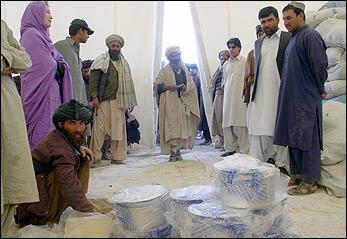
Aid workers distributing household items at Dara-2 camp. Blankets - and tents, where needed - will follow soon.
More than 7,000 new kerosene stoves purchased in Iran for camps in NWFP will arrive in Pakistan this week. As distribution of kerosene begins in the coming days, refugees will receive training to minimise the danger of accidental fires - always a fear when many refugees still live in tents.
Thousands of blankets and quilts - many provided by donations from governments and other UN organisations - are also being stockpiled for distribution before the end of this year. After two years in the harsh climate along the Pakistan-Afghan border, UNHCR is currently conducting a survey to see how many of the original tents need to be replaced. The tents have been stockpiled and will be distributed soon after Eid.
Last year, extreme winter temperatures, normally not expected before January, struck in December and forced UNHCR into an emergency procurement of quilts, blankets and other essentials. This year, the UN refugee agency started the preparations while the camps were still baking under the summer sun.


